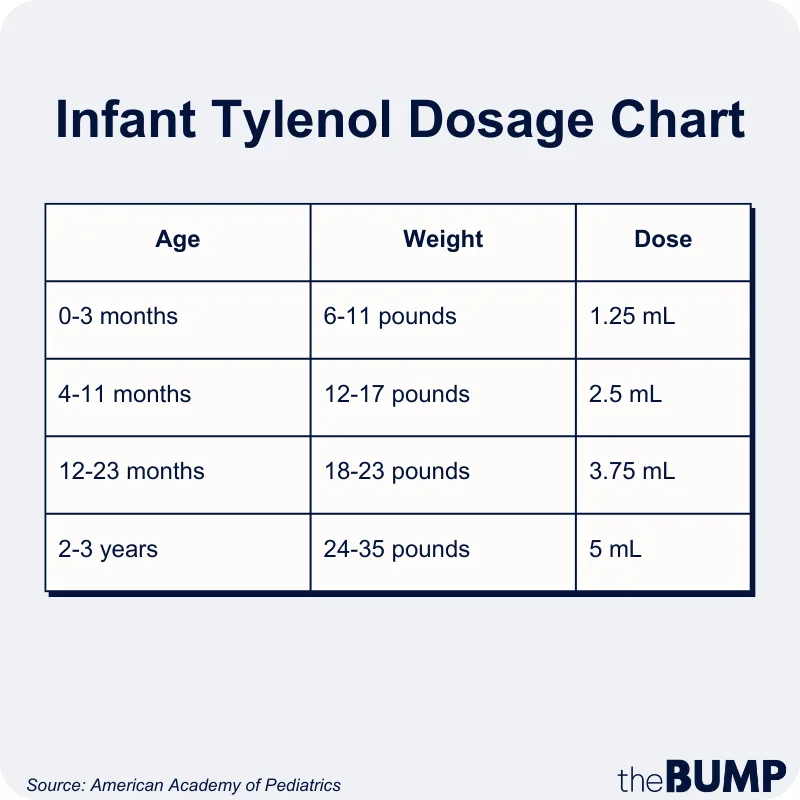When Can Baby Have Acetaminophen? Infant Tylenol Dosage Chart and Tips
It’s 3 a.m. and baby is spiking a fever. Quick, what do you do? If you’re like most new parents, you’ll reach for acetaminophen—typically in the form of Infant Tylenol. In which case, your instincts are spot-on since it’s the pain reliever and fever reducer of choice for young children, especially babies under 6 months. But how much should you give baby (and how often can you give them a dose)? Check out our Infant Tylenol dosage chart, and get tips straight from experts.
Infant Tylenol is a pain-relieving and fever-reducing medication that contains the active ingredient acetaminophen in a formulation made specially for kids and babies. That means it comes in liquid form, so it’s easier for little ones to swallow. It also has a lower concentration of medicine than adult Tylenol, to account for an infant or child’s much smaller body size.
Acetaminophen, including Infant Tylenol, is doctors’ go-to pain reliever and fever reducer for babies under 6 months of age. “It’s the first thing that we would recommend, and that’s because it’s safe and effective,” says Mary Carol Burkhardt, MD, MHA, a pediatrician at Cincinnati Children’s Hospital. It’s also one of two medications recommended for pain relief and fever reduction in babies and children 6 months of age and up (the other is ibuprofen).
Infant Tylenol can be used for relieving everyday aches and pains related to issues such as:
- The common cold
- The flu
- Vaccines
- Minor medical procedures, like blood draws
- Teething
While you can use Infant Tylenol to temporarily lower baby’s fever, it’s often best to check in with your pediatrician any time your little one runs hot, says Jennifer Shu, MD, FAAP, a pediatrician with Children’s Medical Group, P.C. in Atlanta. It’s fine to relieve their discomfort, but you want to make sure it’s nothing that warrants medical attention.
There is no difference in the medication itself: Both products contain 160 milligrams of acetaminophen per 5 milliliters of liquid, with recommended dosing based on weight, says Burkhardt. That said, there’s a slight difference in how each medication is administered. Infant Tylenol contains a syringe that makes it easier for infants to swallow the liquid. Children’s Tylenol has a dosing cup, so it’s a better option for older kids who are able to drink from a cup.
There was a time when the products were actually different. Until 2011, Infant and Children’s Tylenol came in different concentrations. “That led to many safety events,” says Burkhardt—parents, for example, confusing the bottles and giving the wrong dosage to their child—which led the manufacturer to ensure each formulation contains the same concentration of medicine.
Looking for the right Infant Tylenol dosage by weight? Use your child’s weight (and age) in the tables below to figure out how much medicine to offer, as recommended by the American Academy of Pediatrics (AAP).
Infant Tylenol Dosage by Weight
It can take anywhere from 20 minutes to up to an hour for Infant Tylenol to work, says Shu. Burkhardt says most babies will feel the effects within around 30 to 45 minutes when taking the medication orally.
You can give both Infant Tylenol and Children’s Tylenol every four to six hours, as needed. Be sure not to give more than five doses within a 24-hour period, advises Burkhardt.
If baby is under 3 months with a rectal temperature of 100.4 degrees Fahrenheit or higher, you should always call your doctor. If baby is between 3 and 4 months of age with a fever of 101 or higher, reach out to your pediatrician. If your older child needs Tylenol for a continuous fever lasting more than two days or for pain that persists for more than a few hours, it’s a good idea to check in with your provider to rule out more serious causes, says Burkhardt.
Otherwise, make sure you give your child the right dose of medication for their weight. Taking too much Tylenol can cause stomach irritation and, at higher doses, a potentially serious condition known as liver toxicity. “Tylenol is metabolized through the liver, and giving too much or too often, can cause usually temporary liver problems. A large overdose could cause more permanent issues,” explains Shu. Adds Burkhardt: “It definitely contributes to a large number of [emergency department] visits nationally over the course of the year. But it’s a safe medication when used properly.”
To ensure baby gets the right dose of Infant Tylenol, always use the syringe or dosing cup that comes with the product, advises the AAP. It’s a good idea to jot down when and how much medication you’ve given your child, especially if there are multiple caregivers in your house, to ensure you stick to the recommended dosing schedule. Check that you’re not offering any other medications that contain acetaminophen, like some cold medicines. And be sure to always store the bottle out of reach of kids, to avoid accidental overdose.
If you think your child might have overdosed, call the Poison Control hotline (1-800-222-1222) to be connected to your local poison center. Be prepared to tell them your child’s weight and how much medication they took (or, in the case of an accidental ingestion, how much you think they took). Of course, if something just doesn’t seem right and you’re concerned, you can take your child to the ER.
Tylenol can cause an allergic reaction in some people, leading to skin issues like blisters and rash. If this happens to your child, don’t give your child any more medication and call your provider. Also avoid using Infant Tylenol if your child has liver disease or is taking the blood-thinning drug warfarin.
There are other brands offering children’s acetaminophen besides Infant Tylenol, including FeverAll, Panadol and Tempra, as well as generic formulations.
The other mainstay in pain relief, ibuprofen (Advil), isn’t typically used in infants under 6 months of age. It hasn’t been proven safe in younger babies and might be harmful to their developing kidneys and GI tract, says Burkhardt.
After babies are at least 6 months old, however, parents can choose between acetaminophen and ibuprofen (such as children’s Advil) to address the same symptoms. Ibuprofen lasts a little bit longer—you can give it every six to eight hours, instead of every four to six. “As a matter of convenience, some parents may choose that, and some people respond better to one versus the other,” says Shu.
If your child still has a fever or is in pain after taking Tylenol, “it’s very appropriate to alternate back and forth between Tylenol and ibuprofen for better pain or fever control,” says Burkhardt. Don’t take the medications at the same time, but switch between them every three to four hours, sticking to the same maximum dosage over 24 hours for each. Ask your doctor for recommendations based on your child’s age, weight and symptoms.
It’s never fun to see baby feeling unwell. Fortunately, acetaminophen, including Infant Tylenol, is safe and usually very effective for treating pain and fever in young children.
Please note: The Bump and the materials and information it contains are not intended to, and do not constitute, medical or other health advice or diagnosis and should not be used as such. You should always consult with a qualified physician or health professional about your specific circumstances.
Plus, more from The Bump:
Mary Carol Burkhardt, MD, MHA, is a pediatrician at Cincinnati Children’s Hospital. She earned her medical degree from the University of Cincinnati College of Medicine.
Jennifer Shu, MD, FAAP, is a pediatrician with Children’s Medical Group, P.C. in Atlanta and co-author of Heading Home with Your Newborn: From Birth to Reality. She earned her medical degree at the Medical College of Virginia at Virginia Commonwealth University.
Tylenol, Infants’ TYLENOL Suspension, 2023
Nemours KidsHealth, How to Safely Give Acetaminophen, October 2018
Tylenol, Children’s TYLENOL Suspension, 2023
Texas Poison Center Network, You Need to Know: Infant’s & Children’s Acetaminophen Medicine Changes
Healthy Children (American Academy of Pediatrics), Acetaminophen Dosing Tables for Fever and Pain in Children, October 2021
Mayo Clinic, Acetaminophen and Children: Why Dose Matters, June 2022
Healthy Children (American Academy of Pediatrics), Ibuprofen Dosing Table for Fever and Pain, August 2023
Cleveland Clinic, Is It Safe to Take Acetaminophen with Ibuprofen?, February 2023
Learn how we ensure the accuracy of our content through our editorial and medical review process.
Navigate forward to interact with the calendar and select a date. Press the question mark key to get the keyboard shortcuts for changing dates.




















































